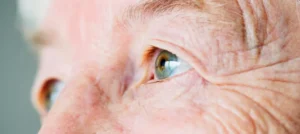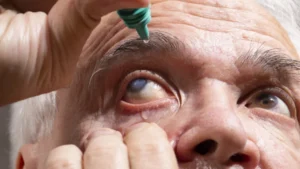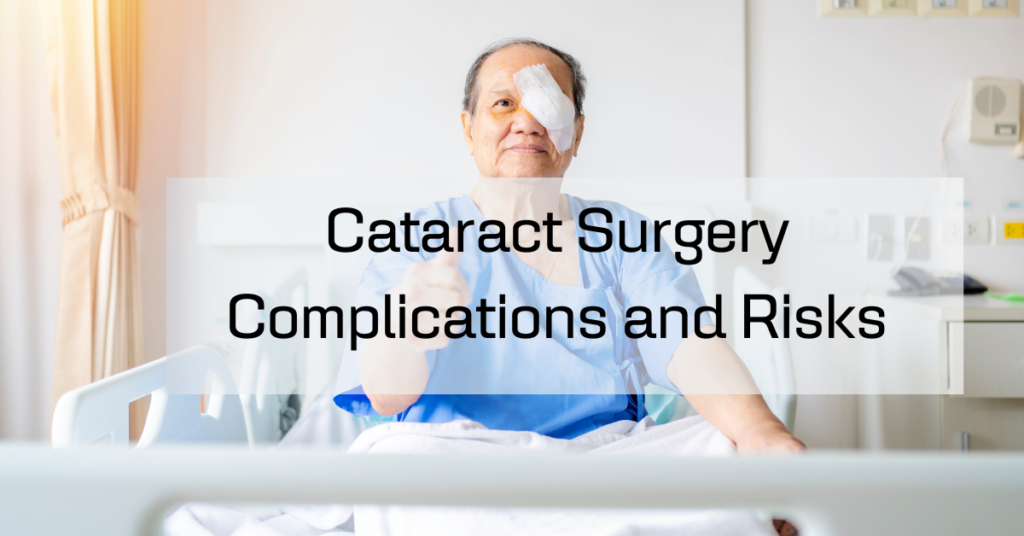Just had cataract surgery and noticed your vision isn’t improving, or maybe it feels like it’s getting worse? It’s understandable to feel concerned. Cataract surgery is generally performed to enhance your vision, but sometimes, the outcome immediately after the procedure might not meet your expectations. In this blog, we’ll tackle the reasons behind why your vision might not seem better after surgery. We’ll look into common complications and risks of cataract surgery, and offer guidance on what these developments mean for you. So, if you’re currently facing uncertainty about your post-surgery vision, this article is here to provide clarity and support.
Contents
Risks Associated with Surgical Procedures
 While cataract surgery is generally safe and effective, certain risk factors can lead to less favorable visual outcomes. Here are key factors associated with a higher risk of poor visual outcomes following surgical procedures:
While cataract surgery is generally safe and effective, certain risk factors can lead to less favorable visual outcomes. Here are key factors associated with a higher risk of poor visual outcomes following surgical procedures:
- As we age, the natural healing process slows down, and the risk of complications increases.
- Elderly patients might face a higher risk of post-surgical complications, affecting visual recovery.
- Pre-existing eye conditions such as diabetic retinopathy, age-related macular degeneration, glaucoma, and severe myopia can impact the success of cataract surgery.
- Difficulties encountered during the surgery, such as damage to the capsule of the lens, can increase the risk of postoperative complications.
- Patients with diabetes, high blood pressure, or other systemic conditions that affect the body’s healing ability may experience slower or less complete recovery after cataract surgery.
To minimize the risk of poor visual outcomes, it’s crucial to have a thorough preoperative assessment with your eye care provider. Additionally, closely following your surgeon’s postoperative care instructions and attending all follow-up appointments are essential steps in ensuring the best possible outcome from your cataract surgery.
Early Cataract Surgery Complications
 After cataract surgery, most patients look forward to a swift and significant improvement in their vision. However, it’s important to be aware of potential early complications that can arise, impacting the recovery process. \
After cataract surgery, most patients look forward to a swift and significant improvement in their vision. However, it’s important to be aware of potential early complications that can arise, impacting the recovery process. \
Here are some complications that might occur shortly after the procedure:
- A common response to eye surgery, inflammation can cause discomfort, redness, and blurry vision.
- Some patients may experience an increase in eye pressure (Elevated Intraocular Pressure (IOP)) following surgery. This can lead to discomfort and is important to manage promptly to avoid damage to the optic nerve.
- Although rare thanks to sterile surgical techniques, infections such as endophthalmitis can occur. Symptoms include severe pain, redness, and vision loss.
- Swelling of the cornea can occur due to trauma during surgery or pre-existing endothelial cell weakness. Patients might notice blurred vision and halos around lights.
Awareness and early detection of these complications are key to addressing them effectively. If you experience any unusual symptoms after your cataract surgery, it’s essential to contact your eye surgeon right away. Regular follow-up appointments are also crucial for monitoring your recovery and ensuring your eyes are healing as expected.
Some Late Complications of Cataract Surgery
While many complications related to cataract surgery occur early and are quickly addressed, there are also potential late complications that patients should be aware of.
Here are some late complications that can arise after cataract surgery:
- Retinal Detachment: This serious condition occurs when the retina, the light-sensitive layer of tissue at the back of the eye, pulls away from its normal position.
Symptoms include a sudden increase in floaters, flashes of light, and a shadow or curtain effect over your vision. Prompt treatment is crucial to prevent permanent vision loss. - Posterior Capsule Opacification (PCO): Although PCO can occur relatively early after surgery, it’s also considered a late complication because it can develop months or years down the line. It causes the back of the lens capsule to become cloudy, affecting vision clarity, but can be effectively treated with a quick laser procedure.
- Secondary Glaucoma: Some patients may experience an increase in eye pressure over time, leading to a form of glaucoma. Regular eye check-ups are important for early detection and management.
- Dislocation of the Intraocular Lens (IOL): The artificial lens implanted during cataract surgery can sometimes shift from its original position, potentially leading to blurred vision or other visual disturbances. This may require additional surgery to reposition or replace the lens.
- Persistent Dry Eye: Some patients might find that their eyes feel dryer for an extended period after surgery, which can cause discomfort and blurred vision. Various treatments are available to manage dry eye symptoms effectively.
- Vitreous/Suprachoroidal Hemorrhage: Bleeding into the vitreous humor (the clear gel filling the eye) or the space between the sclera and choroid layer can occur, usually as a result of surgical complications or underlying vascular issues.
Symptoms include sudden vision loss or a significant decrease in vision, and treatment depends on the severity and underlying cause of the hemorrhage.
If you experience any new or worsening symptoms at any point after your cataract surgery, it’s important to contact your eye care provider immediately. Proactive management can help maintain your vision quality and overall eye health.
Complications That Elder People Might Face After Cataract Surgery
Cataract surgery is a common and generally safe procedure, but elder individuals may face a slightly higher risk of complications due to age-related factors and the potential presence of other underlying health conditions.
Here are some complications that are more prevalent among older adults after cataract surgery:
- Delayed Healing
Older adults often experience slower healing times, which can extend the recovery period after cataract surgery. This slower healing can increase the risk of infection or inflammation. - Increased Risk of Infection
As the immune system weakens with age, elder patients are at a higher risk of developing post-operative infections, such as endophthalmitis, a serious infection inside the eye. - Posterior Capsule Opacification (PCO)
While PCO can affect anyone who has had cataract surgery, older individuals might experience this complication sooner. PCO causes the part of the lens capsule remaining in the eye to become cloudy, affecting vision clarity. - Macular Edema
This condition, characterized by swelling in the central part of the retina (macula), can lead to vision distortion. Older adults are more susceptible to developing macular edema after surgery. - Exacerbation of Pre-existing Eye Conditions
Elderly patients with pre-existing eye conditions, such as glaucoma or age-related macular degeneration, may see these conditions worsen after cataract surgery. - Dry Eye Syndrome
Older individuals are more prone to experiencing dry eye symptoms, and cataract surgery can exacerbate this condition, leading to discomfort and blurred vision.
To mitigate these risks, it’s crucial for elderly patients to undergo a thorough pre-surgical assessment to identify any potential concerns and manage existing eye conditions.
How to Manage & Avoid These Complications

- Follow your eye doctor’s instructions closely after surgery.
- This includes taking prescribed medications, such as antibiotics and anti-inflammatory eye drops, to prevent infection and reduce inflammation.
- In the weeks following surgery, protect your eyes from injury and avoid activities that could strain them. Wearing sunglasses outside can help protect your eyes from UV light and reduce glare.
- Maintain a Healthy Diet: A diet rich in vitamins and antioxidants can support eye health.
- Focus on foods high in Vitamins C and E, zinc, lutein, and omega-3 fatty acids, such as leafy greens, fish, nuts, and fruits.
- If you have diabetes or high blood pressure, managing these conditions is vital for preventing further eye problems.
- Limit Screen Time: Take frequent breaks using the 20-20-20 rule: every 20 minutes, look at something 20 feet away for at least 20 seconds.
- If you live in a dry environment, consider using a humidifier to keep the air moist and help prevent dry eyes.
FAQs
While cataract surgery is generally safe and complications are rare, there is a small risk that it could lead to retinal damage. One specific risk is retinal detachment, where the retina pulls away from the back of the eye. Symptoms include sudden flashes of light, an increase in floaters, and a shadow or curtain effect across your vision. Though this complication is uncommon, early detection and treatment are crucial for preserving vision.
The rate of complications from cataract surgery is relatively low. Studies suggest that significant complications occur in approximately 1-2% of cataract surgeries. With advances in surgical techniques and technology, cataract surgery has become one of the safest and most effective types of surgery. Most patients experience a significant improvement in vision with a minimal risk of serious complications.
Experiencing some degree of blurry vision immediately after cataract surgery is common as your eye heals and adjusts to the new lens. However, if your vision remains blurry 2 weeks post-surgery, it could be due to several factors, including swelling of the cornea or retina, the adjustment period of the intraocular lens, or pre-existing eye conditions like dry eye syndrome. In most cases, this blurriness will improve over time.



